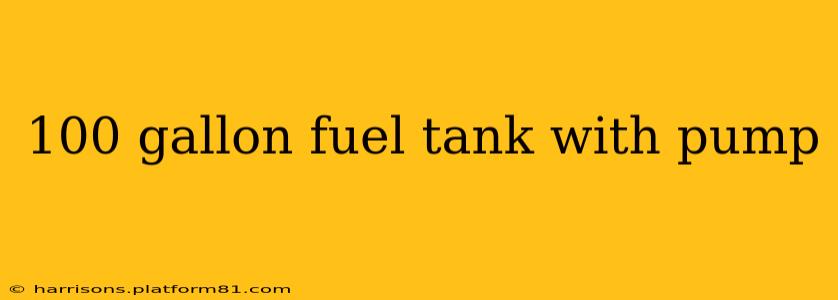Choosing the right 100-gallon fuel tank with a pump can be daunting. This guide will help you navigate the options, understand the key features, and select the best system for your needs. Whether you're a farmer, contractor, or homeowner with significant fuel demands, understanding the nuances of these systems is crucial.
What are the Different Types of 100-Gallon Fuel Tanks with Pumps?
There's a wide variety of 100-gallon fuel tanks with pumps on the market, categorized primarily by material, pump type, and intended use.
-
Material: Steel is the most common material due to its strength and durability. Polyethylene tanks offer lighter weight and corrosion resistance, ideal for less demanding applications. Some higher-end tanks might utilize stainless steel for superior corrosion resistance.
-
Pump Type: The type of pump significantly influences flow rate, ease of use, and price. You'll commonly encounter:
- Rotary Vane Pumps: These are reliable and relatively inexpensive, offering good flow rates for most applications.
- Gear Pumps: Known for their durability and ability to handle thicker fuels, these are a more robust option.
- Centrifugal Pumps: These pumps excel at high-flow applications but might be less suitable for viscous fuels. Electric submersible pumps are also a popular choice for their ease of installation and operation.
-
Intended Use: Tanks are designed for specific fuels like diesel, gasoline, or kerosene. Ensure compatibility before purchasing. Some tanks are designed for above-ground use, while others are suitable for underground installation (requiring specific permits and installations).
What are the Key Features to Consider When Choosing a 100-Gallon Fuel Tank with Pump?
Several crucial features will determine the suitability of a 100-gallon fuel tank for your needs:
-
Flow Rate: The gallons per minute (GPM) output is crucial. Higher GPM means faster fueling, but it also usually means a more powerful (and potentially more expensive) pump.
-
Pump Type (as discussed above): Select a pump that matches your fuel type and flow rate requirements.
-
Automatic Shut-Off: This safety feature prevents overfilling and spills.
-
Metering System: A meter allows you to accurately track fuel consumption.
-
Material (as discussed above): Consider durability, corrosion resistance, and weight.
-
Mounting Options: Tanks can be mounted on a stand, in a skid, or even underground.
-
Compliance: Ensure the tank meets all relevant safety and environmental regulations in your area.
How Much Does a 100-Gallon Fuel Tank with Pump Cost?
The price range for a 100-gallon fuel tank with a pump is quite broad, varying widely depending on the features, material, and pump type. Expect to pay anywhere from a few hundred dollars for a basic model to several thousand dollars for a more sophisticated system with advanced features.
What are the Safety Precautions When Using a 100-Gallon Fuel Tank with Pump?
Safety should always be the top priority when handling fuel. Here are some essential precautions:
-
Proper Ventilation: Always ensure adequate ventilation when using the tank and pump to avoid the buildup of flammable vapors.
-
Grounding: Properly ground the tank to prevent static electricity buildup.
-
Fire Suppression: Keep a fire extinguisher nearby.
-
Spill Containment: Use a containment area or tray to prevent spills.
-
Follow Manufacturer's Instructions: Carefully read and follow all instructions provided by the manufacturer.
Where Can I Buy a 100-Gallon Fuel Tank with Pump?
You can typically find 100-gallon fuel tanks with pumps at agricultural supply stores, equipment rental companies, online retailers, and some home improvement centers. It is always recommended to purchase from reputable suppliers to ensure quality and compliance.
What are the Maintenance Requirements for a 100-Gallon Fuel Tank with Pump?
Regular maintenance extends the life and safety of your fuel tank system. This typically includes:
-
Regular Inspections: Check for leaks, corrosion, and damage.
-
Filter Changes: Replace fuel filters as recommended by the manufacturer.
-
Pump Maintenance: Lubricate and clean the pump as needed.
-
Water Removal: Regularly drain any water that may have accumulated in the tank.
This comprehensive guide provides a solid foundation for choosing and maintaining a 100-gallon fuel tank with a pump. Remember to prioritize safety and always consult with professionals if you have any doubts or require assistance with installation or maintenance.
